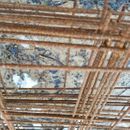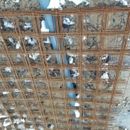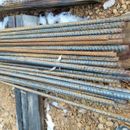Rust Removal with Phosphoric Acid – Rebar and Welded Wire Mesh
Edit: added pictures
Hi. I am in zone 4a and building a 28×80 post frame shop with concrete slab.
Is it ok to use Phosphoric Acid to remove rust from Welded Wire Mesh and Rebar?
My WWM and #4 rebar have sat in the weather for several months and there is a mild but complete layer of rust on WWM and spot locations on Rebar.
I have used Phosphoric Acid for rust removal many times on steel material with great success. So, I know it would be a piece of cake to use a garden sprayer to coat the reinforcement material and have zero rust a day later. However, since this will be in my concrete slab, I did not know if this will result in some bad outcome on concrete reinforcement.
Note: the WWM will be used in the foot traffic area of shop and the #4 rebar will be used in equipment and vehicle traffic areas. `
This may be outside the scope of knowledge here, but I thought I would ask in case anyone knew. I have searched the topic online and it is surprising to me that no one has ever thought the same thing.
Thank you.
-Mike
GBA Detail Library
A collection of one thousand construction details organized by climate and house part












Replies
Mike,
You are fine leaving things alone. . Rebar with nothing more than surface rust actually adheres better to concrete. It's only when the corrosion reduces the bars to below their minimum dimensions that it is a problem.
Mike, I'd back up one step and ask "if there any problem if I leave the rust on?".
The rust doesn't matter. Rebar is pretty much always at least a little rusty when the slab is poured. Once the rebar/rerod is encased in concrete, the chemistry of the concrete itself will prevent further rusting of the material.
You can get rerod with a coating (I think an epoxy, but I'm not sure), but it's expensive. It's most commonly used in certain types of road and bridge construction, and it's typically light green in color. I've never seen it used on a residential project, or even most commerical buildings.
Bill
Bill, I'd be careful about claiming that concrete's chemistry will "prevent further rusting." It's true that if clean steel is used that the concrete will form a protective rust layer on the rebar, similar to Cor-Ten steel, but if the rebar is close enough to the surface that water, oxygen and/or salt can reach it, the rust will continue, expand and blow out the concrete. I see it occasionally on old foundations. More info here: https://www.cement.org/learn/concrete-technology/durability/corrosion-of-embedded-materials
Jon,
While I feel your discomfort deep in my bones, codes actually state that rebar shall not be rejected for surface rust. The rebar looks fine to me. Ive always hated the way mesh looks when it gets rusted. I would take a sample and remove rust and measure the diameter of virgin metal and compare to specs. If it has lost any more than 5-10% of the area, I would eat the cost and replace.
I have seen a lot of metal thrown into concrete, and while I would have personally objected to some of it, I can't say that ive seen it cause catastrophic failure, at least in the short term.
Typical rerod and remesh are not made of the worlds best quality steel. This doesn't make any real difference in most normal applications though, since the rerod/mesh only provides some extra tensile strength to the concrete, which otherwise is primarily a compressively strong material (my own made up word there :-).
There ARE better grades of reinforcement available, and those are what go into more critical things like prestressed concrete girders and things like that. You won't find this stuff in the box stores though, and it will be priced a lot higher than what you're probably used to seeing.
Way back in college, one of the civil engineering professors was doing testing on carbon fiber rerod. They had a big machine that would cycle test a section of bridge until it failed. I remember it being annoying to take tests while that machine was running due to the "wump.... wump... wump..." sound it made that would carry through the floor of the engineering building.
Bill
Bill I disagree that rebar "only provides some extra tensile strength to the concrete." In some cases that's true, such as a pole barn slab. But in most cases, concrete and steel are equally important--concrete provides the compressive strength while rebar provides tensile strength. You can't build anything significant out of concrete alone.
There's nothing low-quality about rebar, despite its lowly appearance. It's not tempered, which does lead to more rusting. The commonly available type is grade 40, rated for 40,000 psi of tensile strength. The higher-strength type is grade 60, good for 60,000 psi. The tensile strength of unreinforced concrete is about 1/10 its compressive strength, or roughly 300 psi. In other words, the steel is 100 to 200 times stronger in tension than concrete.
That's pretty much what I had intended to say, the steel provides compressive strength that the concrete mostly lacks, but the concrete provides compressive strength. Together the system is stronger than either material alone.
It's true though that the steel used for normal reinforcement materials is generally considered to be a low-grade steel. That's not a problem in this application, but there are better steels used in other applications. This might just be a difference in perceptions though, since I originally came from a more aerospace-focused industry that could be a bit snobbish with their materials ;-)
Bill
Mikeysp,
Somewhere in one of my backup drives I have a copy of a report that covered whether rusty rebar had any effect on strength in general use. I will take a poke at finding it. Basically, it said no. Bridges and high rises (and launch pads) are another whole ball game as Zephyr notes.